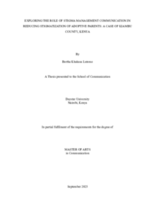Adoption offers children safe and nurturing family environments, yet in Kenya adoptive parents often face stigmatization rooted in cultural beliefs that privilege biological lineage. Such stigma leads to secrecy, exclusion, and discrimination, limiting children’s chances of permanent homes. Although communication is central in shaping public perceptions, little research in Kenya has examined how stigma management communication can reduce adoption-related stigma. This study therefore explored the role of stigma management communication in reducing stigmatization among adoptive parents in Kiambu County. Guided by Stigma Management Communication Theory (Meisenbach, 2010), the study employed a qualitative research design and conducted 13 in-depth interviews with adoptive parents selected through snowball sampling. Data were analyzed thematically. The findings revealed three dominant themes: (1) stigma is communicated through cultural narratives of bloodline and inheritance, community gossip, and institutional practices that portray adoption as abnormal; (2) adoptive parents use a range of stigma management communication strategies, including concealment, disclosure, reframing, selective association, and advocacy, to navigate stigmatizing interactions; and (3) these strategies influence public perceptions by gradually normalizing adoption in interpersonal, community, and media contexts.
The study concludes that stigma management communication plays a crucial role not only in helping adoptive parents cope with stigma but also in transforming wider societal attitudes. It recommends strengthening awareness campaigns, promoting storytelling and media advocacy, and leveraging community and religious platforms to foster greater acceptance of adoption. These findings extend stigma management communication theory to the adoption context in Kenya and provide practical insights for policy, advocacy, and communication-based interventions aimed at reducing adoption stigma.

